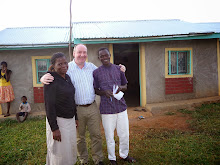Moses, Paul James and I
We broke down.
There was nothing for it, we had to get out of the car and push.
It was hot, we were in Nakumatt supermarket car park in the middle of town and we were trying to bump start the little Toyota 110 whose battery had sadly failed us.
We pushed it down the short ramp, out past the shopping mall entrance and down towards the busy back street, lined with wooden shacks hung with t-shirts and shoes, bags and phones and all manner of amazing things. Bicycles, tuk-tuks, cars and motorcycles plied this route for business, it was no place to be stranded and we pushed as hard as we could.
But we had no luck.
Rather than risk the wrath of the van drivers, motorcyclists and tuk-tuk drivers we pushed the car up against a wall to the side of the road.
This, rather unfortunately, turned out to be the wall at the entrance to the Kenya Post depot, into which lorries regularly turned to pick up and deliver their loads.
We were, to be frank, a bit of a nuisance.
Well actually, it was only Paul James and I that were a nuisance, as by this time Moses had put the bonnet up, hit the battery with a pair of heavy pliers a couple of times and then run off to find someone who might help.
A friend of his worked in the Supermarket and the car’s mechanic only worked around the corner, so cries for help were sent out into many directions.
Just the other side of the wall was a kiosk selling fresh meat.
That statement may be the biggest lie on this blog to date, but I can factually guarantee that it was a kiosk and it did sell meat.
We bought a kilo of goat meat from it just yesterday for 300 shillings (£2.50) and then Moses turned it into a stew with groundnuts and chilli. But, as we stood waiting, the smell from the kiosk was less than pleasant in the afternoon sun.
Eventually Moses returned from his sojourn into the depths of Nakumatt with a new battery. It was clear that the old one had no life left at all, despite the encouragement from a passer by to fill it with coca cola – guaranteed, apparently, to get it going again.
Ad so we returned, somewhat later than planned, to the hotel.
It was just as well, as this evening we had planned a wonderful supper.
Moses returned home to change into his finery and to pick up Tatu, his naturally beautiful Tanzanian wife, and then returned, with Paul James, at the customary 45 minutes later than we had agreed.
We jumped in the car and headed to town.

Whilst Moses parked the car (some distance from the kerb) we headed inside.
The restaurant is upstairs in a small shopping mall, above the Fly540 offices and next to a foreign exchange. It is unassuming, but welcoming, lit with red lanterns and a warm smile.
We were shown to our table and ordered the mandatory prawn crackers, which appeared a few minutes later with a fiery red chilli sauce, a tamarind dip and onions.

Moses was curious to know how things were cooked. After his success in the kitchen with the goat and the mushrooms he is looking at oriental cuisine as a logical next step.
In particular he loved the spare ribs and tried to guess the flavours. I told him that good spare ribs are marinated for a long time so that the juices flow into them and slowly flavour the meat before they are cooked on hot flames. He was intrigued.
As we ate chicken wings - sorry, as Tatu ate the chicken wings and the rest of us tucked into the spare ribs – we reflected on the time we have spent together.

And it has been good.
As we talked we looked back over the ten years of the Trust.
We talked about this wonderful place, about the need to spend time here and get to know it, to get to know the people and to get to an understanding of the culture.
There have been times when we have tried to go too fast, times when we have worked in our own strength and tried to force things to happen and times when we have waited to see and understand the best thing to do.
But we all agreed that, over the last ten years, this place has been marinating us, seeping into our bones, getting under our skin, helping us to understand. And we are much better for the experience.
The flavours coming out are good, this trip has left a wonderful taste.















